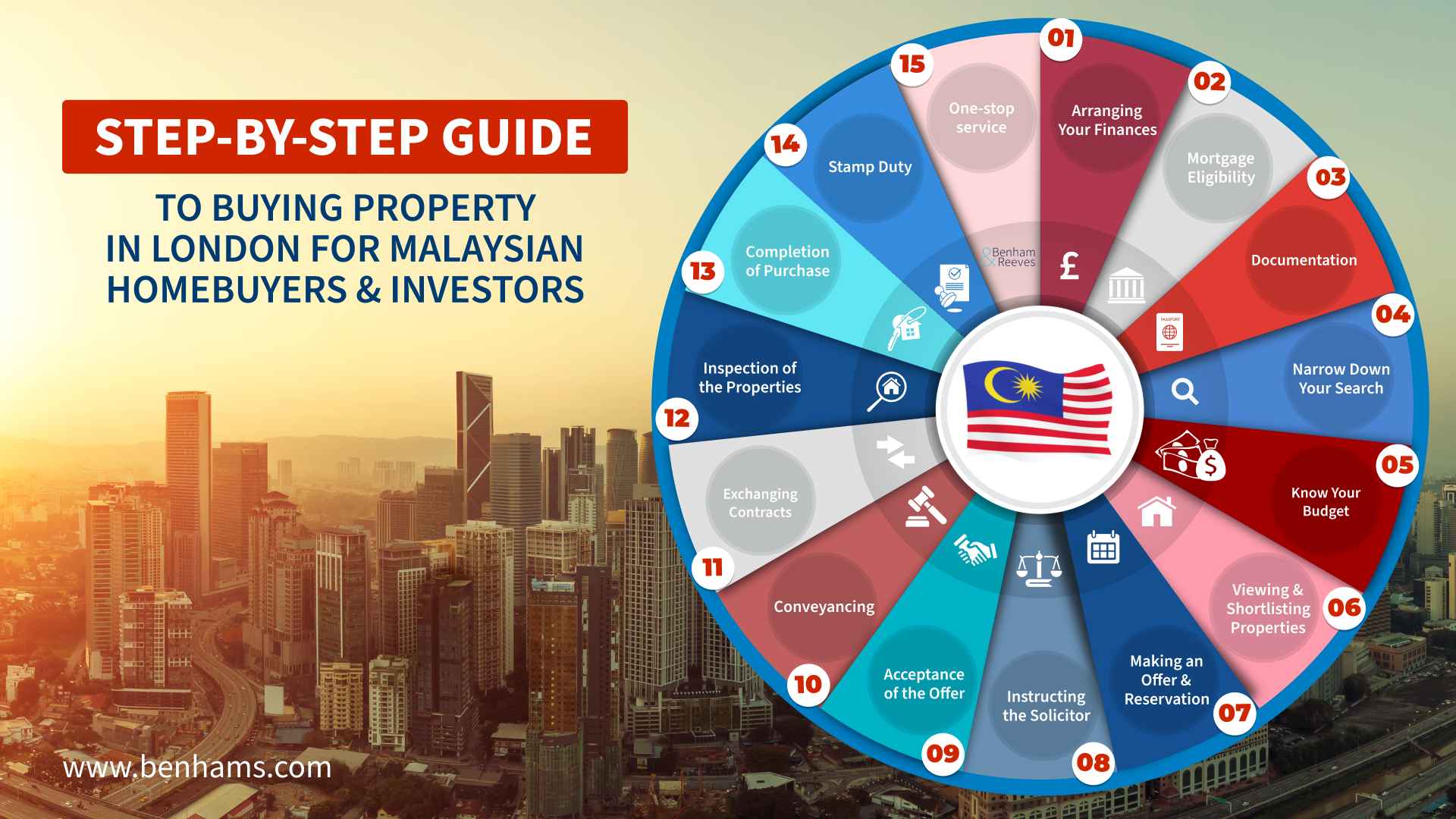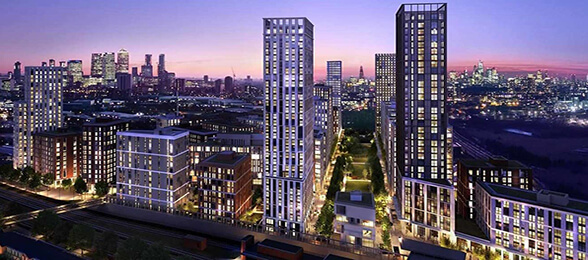Introduction
Over 3,400 London residences were linked to Malaysian addresses at the start of 2023, making the Southeast Asian country among the top five from the continent with homes in the UK capital. With over 5% of all foreign property buyers in London, this number is only increasing as more Malaysian homebuyers and investors realise the potential of a robust and resilient property market outside Malaysia.

In addition to attractive rental yields, which can go upwards of 6% in some neighbourhoods, the prospects of long-term capital gains and lifestyle benefits of Europe's largest financial, education and technology hub make London the top choice for many overseas investors.
High rental demand
With a population of over nine million and growing, London continues to attract professional talent and students from other countries. The increasing number of people coming in each year puts immense pressure on its housing market, creating greater rental demand and higher rents. According to Zoopla, the average rent in London this year is £2,121 (RM 12,000 approx.), almost double the UK average of £1,220. At Benham & Reeves, every available rental unit with us receives at least 15 enquiries. With 21 branches across London and our dedicated China and Japan Desk, we can quickly source well-paying, high-calibre professional tenants.
Strong capital growth
According to data published by Nationwide Building Society, property prices in London and across the UK have witnessed significant growth as the national average reported stands at almost 54% for the last decade. Similarly, several areas in London, such as Waltham Forest and Newham, reported over 100% growth in property prices for the last decade. Further upgrades in the transport infrastructure and regeneration of the city, coupled with macroeconomic factors such as cuts in interest rates and a drop in inflation, have led to increased activity in the property market.
Diversification and security
Investing in an overseas property helps Malaysian investors diversify their portfolio by spreading risk outside their country and investing in a stable market with assured returns. Furthermore, the UK is a secure investment destination with a transparent legal system supported by comprehensive regulations to protect the rights and interests of property buyers.
While investing in a London property has plenty of benefits, the buying process can get complicated if you do not have the right agent to help you. For example, all property transactions in the UK need a UK-based solicitor and conveyancer. The mortgage rules will also differ, for which you may need the help of a reputable mortgage broker. At Benham & Reeves, we have a legacy of over 65 years of helping overseas investors acquire top London properties. In addition to our 21 branches across London, we have an experienced team in Kuala Lumpur to assist you with finding and buying your overseas dream home.
To help you further, we have created this simple, step-by-step guide explaining the entire property purchase process in the UK.
Arranging your finances
Whether you buy a property with direct cash or secure financing from a UK or Malaysian bank, setting a budget and arranging the required finances is crucial before planning a purchase. While Malaysian buyers can qualify for a UK mortgage loan, you need to understand the pros and cons of different financing types. Firstly, you need to decide if you want to buy a ready property (for immediate move-in or rental income) or an off-plan scheme where you get the flexibility to make staged payments to the developer.
Be clear on your purpose of purchase, as the mortgage terms would differ accordingly. For example, buy-to-let mortgages may require the buyer to pay a higher deposit for their interest-only loans, calculated based on the rental potential of the asset. On the other hand, residential mortgages are more expensive in the long term, although you may have to pay a smaller deposit upfront. For cash buyers with liquidity, establishing the source of funds is mandatory in the UK.
Mortgage eligibility
As stated above, your mortgage eligibility in the UK will differ based on the purpose of the property purchase. Typically, lenders need to assess your ability to pay the amount back with interest at the end of the term. Payment terms are generally negotiated based on the risk involved, including the loan-to-value (LTV) ratio, annual income and payment strategy (through rental income or salary).
While many developers in London accept deposits between 10-15%, we encourage buyers to opt for paying a bigger deposit, as it decreases lender risk and expedites the overall mortgage process. Additionally, for salaried individuals we advise considering a benchmark of 4.5 times their annual salary when seeking a mortgage as you do not want your entire salary consumed in monthly instalments. Working with a reputable mortgage broker in the UK can help you navigate this process smoothly.
Documentation
As a Malaysian property buyer in the UK, you will need the following documents to get started with the buying process
Narrow down your search
Whether it is a stylish studio in Zone 1 or a large Victorian house in the outer Boroughs, we have all types and sizes of properties across the city available with us. However, as a buyer, to avoid getting overwhelmed with the options, try considering a few things before you start looking at properties.
Know your budget
Buying a London property involves additional expenses, exceeding the purchase price. Here’s an overview of the payments you will need to budget for
Legal fees
The expertise of a UK solicitor is mandatory for managing legal matters like conveyancing and drafting contracts. Legal fees typically range from £1,800 to £4,000.
Mortgage fees
If you plan on applying for a mortgage, you may need to pay service charges for loan processing and additional valuations requested by the lender.
Stamp Duty Land Tax (SDLT) For non-UK residents, the following SDLT rates apply based on property value
Maintenance charges
Leasehold properties often come with annual ground rent and service charges, typically ranging from £200 to £600, depending on the property size and services offered.
Miscellaneous Costs
Allocate around £500 to £700 for additional expenses such as transaction fees, insurance, and legal paperwork.
Furnishings
While optional, it’s wise to account for furnishing costs, especially if you plan to rent out the property or use it for personal purposes.
Keep in mind that these are estimates, and actual costs may vary.
Viewing & shortlisting properties
To make a well-informed decision about which property to purchase and where, it’s essential to experience the property firsthand before making an investment. With 21 branches across London and a dedicated team in Malaysia, we can arrange for either a physical or virtual viewing of shortlisted properties for you and your family members.
Sending an offer & reservation
Once you have selected the property you want to buy, we will communicate your offer to the developer or seller and guide you through the remaining steps. Your deposit and subsequent payments will depend entirely on the type of property you are buying.
Instructing your solicitor
Property transactions in London mandate the services of a UK-based solicitor, and we can arrange that for you as we work with some of the best solicitors and conveyancers in the country. Once you've secured the property, your appointed solicitor will manage all the necessary paperwork to protect your rights throughout the purchase process.
The documents your solicitor will require include
Acceptance of the offer
After your offer is accepted, you need to pay the reservation fee and sign the required documents for your solicitor to begin drafting the contract. To ensure a smooth process
Conveyancing
After the offer is accepted, your instructed solicitor will manage the legal aspects of the buying process, also known as conveyancing. This process includes the following steps
Exchanging contracts
Before the official exchange of contracts, neither buyer nor seller have any legal obligations. However, once contracts get exchanged, all the terms and conditions of the agreement are legally enforceable and should be honoured.
Some key points to remember when exchanging contracts
Property inspection (snagging)
It's always good practice to take possession of a new property after conducting a thorough inspection of everything included with it. Commonly known as snagging or property inspection, this process will help reveal any defects or shortcomings in the property before you take legal possession of it. Here's how a typical snagging process unfolds
Inspection meeting
The seller or property developer will arrange a meeting after you've checked the property and shared a list of all your concerns or things you would like fixed. From internal leakages to paint stains or even new door knobs, you can share a list of all your grievances and seek improvements if needed.
Feature demonstration
A brand-new apartment or house will have new appliances and electrical features the developer will need to explain to you before handing over the keys. From central heating to the plumbing and light features, the developer will share all necessary information.
Completion of purchase
Completion occurs when you make the final payment to your solicitor, covering the total purchase price minus the deposit you paid during the contract exchange. Your solicitor will then transfer the remaining funds to the seller’s solicitor.
Once the funds have been successfully transferred, the process is complete. Congratulations, you are now the proud owner of a property in London!
Stamp duty payment
Within two weeks of completing your property purchase, you must pay the required SDLT, a percentage of the property's value to HMRC. SDLT applies to property purchases above a certain threshold in the UK, with an additional 2% surcharge for non-UK residents.
To qualify as a UK resident for SDLT purposes, you must have spent at least 183 consecutive days in the UK during the previous tax year. You can prove your residency by producing relevant documents like utility bills, bank statements, or phone usage records. The surcharge does not apply if you lease the property for seven years or less from the date you take possession.
If multiple buyers are involved and at least one is a non-UK resident, all buyers are treated as non-UK residents and will incur the surcharge. However, if you are married or in a civil partnership and one partner is a UK resident, both will be considered UK residents for the transaction. Your solicitor will calculate the SDLT amount and prepare your Stamp Duty Land Tax return.
Additionally, you can also use our stamp duty calculator to calculate your SDLT liability.
One stop service
At Benham & Reeves, we provide a comprehensive service package, designed specifically for Malaysian and overseas property buyers to ensure a smooth and hassle-free experience in London.
Our wide range of services include






